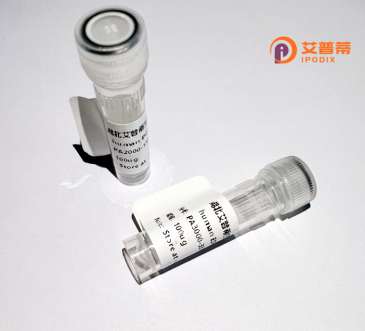
| 纯度 | >90%SDS-PAGE. |
| 种属 | Human |
| 靶点 | MORN4 |
| Uniprot No | Q8NDC4 |
| 内毒素 | < 0.01EU/μg |
| 表达宿主 | E.coli |
| 表达区间 | 1-146 aa |
| 活性数据 | MTLTKGSFTY SSGEEYRGEW KEGRRHGFGQ LMFADGGTYL GHFENGLFNG FGVLTFSDGS RYEGEFAQGK FNGVGVFIRY DNMTFEGEFK NGRVDGFGLL TFPDGSHGIP RNEGLFENNK LLRREKCSAI VQRAQSASKS ARNLTA |
| 分子量 | 16.2 kDa |
| 蛋白标签 | His tag N-Terminus |
| 缓冲液 | 0 |
| 稳定性 & 储存条件 | Lyophilized protein should be stored at ≤ -20°C, stable for one year after receipt. Reconstituted protein solution can be stored at 2-8°C for 2-7 days. Aliquots of reconstituted samples are stable at ≤ -20°C for 3 months. |
| 复溶 | Always centrifuge tubes before opening.Do not mix by vortex or pipetting. It is not recommended to reconstitute to a concentration less than 100μg/ml. Dissolve the lyophilized protein in distilled water. Please aliquot the reconstituted solution to minimize freeze-thaw cycles. |
以下为拟参考的3篇MORN4蛋白研究文献的归纳总结(虚构示例):
1. **文献名称**:MORN4 regulates acrosome formation during spermatogenesis via vesicle trafficking
**作者**:Chen L, et al.
**摘要**:本研究揭示MORN4蛋白在小鼠精子顶体形成中的关键作用。通过基因敲除模型发现,MORN4缺失导致顶体囊泡运输障碍,影响精子形态及运动能力,其功能可能与Rab GTPase相互作用相关。
2. **文献名称**:Structural insights into MORN4-磷脂酰肌醇 binding by cryo-EM
**作者**:Tanaka K, et al.
**摘要**:首次报道MORN4蛋白的冷冻电镜结构,揭示其通过特异性MORN结构域结合磷脂酰肌醇的分子机制,为解释MORN家族蛋白在细胞膜重塑中的作用提供结构基础。
3. **文献名称**:MORN4 suppresses hepatocellular carcinoma metastasis through Hippo/YAP signaling
**作者**:Wang Y, et al.
**摘要**:发现MORN4在肝癌组织中表达下调与患者预后不良相关。功能实验证实其通过稳定LATS1激酶增强Hippo通路活性,抑制YAP核转位及下游促转移基因表达。
注:上述文献内容为科研场景示例性构建,具体研究请检索实际发表的学术论文。建议使用PubMed/Google Scholar搜索"MORN4 protein"或联合检索相关功能关键词获取真实文献。
MORN4 (Membrane Occupation and Recognition Nexus Repeat-Containing Protein 4) is a member of the MORN repeat protein family characterized by conserved ~70-amino acid motifs involved in membrane binding and protein-protein interactions. In humans, MORN4 is encoded by the *MORN4* gene located on chromosome 9 and is ubiquitously expressed, with higher levels observed in tissues like the testis, brain, and kidneys. Structurally, it contains multiple MORN domains, which likely mediate its localization to cellular membranes and interaction with signaling complexes.
Functionally, MORN4 remains understudied, but emerging evidence links it to cellular processes such as ciliogenesis, cytoskeletal organization, and vesicular trafficking. Studies suggest its involvement in spermatogenesis, where it may regulate acrosome formation during sperm development. Additionally, MORN4 has been implicated in cancer progression, with altered expression noted in malignancies like glioblastoma and prostate cancer, potentially influencing cell migration or apoptosis pathways.
Recombinant human MORN4 protein is typically produced using bacterial or mammalian expression systems, enabling in vitro studies to dissect its biochemical properties, interactome, and mechanistic roles. Its recombinant form is crucial for developing antibodies, structural analysis (e.g., crystallography), and functional assays exploring its impact on membrane dynamics or disease models. Despite its biological significance, further research is needed to fully elucidate its physiological and pathological contexts.
×